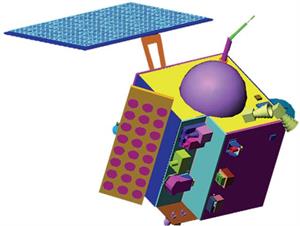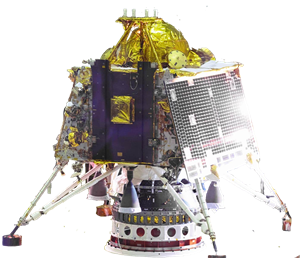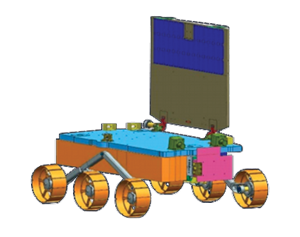
PUMPA - SMART LEARNING
எங்கள் ஆசிரியர்களுடன் 1-ஆன்-1 ஆலோசனை நேரத்தைப் பெறுங்கள். டாப்பர் ஆவதற்கு நாங்கள் பயிற்சி அளிப்போம்
Book Free DemoOn July\ 22,\ 2019, ISRO launched Chandrayaan-2, a follow-up mission to Chandrayaan-1. In comparison to previous ISRO mission, the Chandrayaan 2 mission was an extremely complex one, as it combined an Orbiter, Lander, and Rover. This mission aims to explore the Moon's south pole since its surface area is much larger and shadowed than the north pole.

Chandrayaan 2 satellite
Orbiter:
The orbiter orbits the moon and communicates with the Indian Deep Space Network (IDSN) at Bylalu and the Vikram Lander.
The orbiter orbits the moon and communicates with the Indian Deep Space Network (IDSN) at Bylalu and the Vikram Lander.
Lander:
In honour of Dr. Vikram A. Sarabhai, the founder of the Indian space program, the lander was named 'Vikram'.
In honour of Dr. Vikram A. Sarabhai, the founder of the Indian space program, the lander was named 'Vikram'.

Vikram lander
Rover:
Rover is a six-wheeled robotic vehicle called 'Pragyan', derived from Sanskrit, meaning 'wisdom'. On August\ 20,\ 2019, Chandrayaan-2 was successfully placed into lunar orbit. On September\ 7,\ 2019, Lander ''Vikram'' lost contact with the ground station when it was 2.1\ km above the Moon's surface during its final stages of the flight.
Rover is a six-wheeled robotic vehicle called 'Pragyan', derived from Sanskrit, meaning 'wisdom'. On August\ 20,\ 2019, Chandrayaan-2 was successfully placed into lunar orbit. On September\ 7,\ 2019, Lander ''Vikram'' lost contact with the ground station when it was 2.1\ km above the Moon's surface during its final stages of the flight.

Pragyan rover
The Orbiter, on the other hand, continues to succeed in its mission.
Reference:
https://www.isro.gov.in/